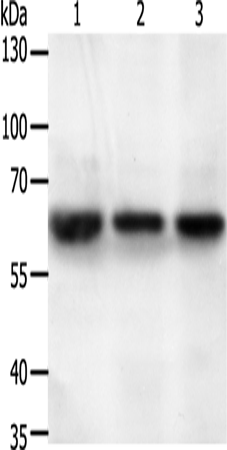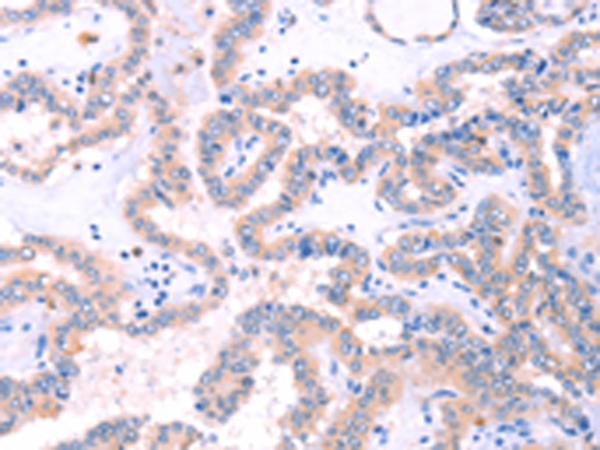


| WB | 咨询技术 | Human,Mouse,Rat |
| IF | 咨询技术 | Human,Mouse,Rat |
| IHC | 1/50-1/300 | Human,Mouse,Rat |
| ICC | 技术咨询 | Human,Mouse,Rat |
| FCM | 咨询技术 | Human,Mouse,Rat |
| Elisa | 1/5000-1/10000 | Human,Mouse,Rat |
| Aliases | FHL5; UNC18B; Hunc18b; UNC18-2; pp10122; MUNC18-2 |
| WB Predicted band size | 66 kDa |
| Host/Isotype | Rabbit IgG |
| Antibody Type | Primary antibody |
| Storage | Store at 4°C short term. Aliquot and store at -20°C long term. Avoid freeze/thaw cycles. |
| Species Reactivity | Human, Mouse, Rat |
| Immunogen | Fusion protein of human STXBP2 |
| Formulation | Purified antibody in PBS with 0.05% sodium azide and 50% glycerol. |
+ +
以下是关于RIC3抗体的3篇参考文献示例(注:部分信息为模拟示例,实际文献需根据具体研究补充):
1. **文献名称**:RIC3 Antibody Reveals Subcellular Localization and Modulation of Nicotinic Acetylcholine Receptor Maturation
**作者**:Smith A, et al.
**摘要**:该研究使用特异性RIC3抗体,通过免疫荧光和Western blot技术,揭示了RIC3蛋白在内质网中的定位及其对α7烟碱型乙酰胆碱受体(α7-nAChR)组装的关键调控作用,表明RIC3缺陷导致受体表面表达减少。
2. **文献名称**:Altered RIC3 Expression in Schizophrenia: A Post-Mortem Brain Study
**作者**:Chen L, et al.
**摘要**:研究者利用RIC3抗体对精神分裂症患者前额叶皮层样本进行免疫组化分析,发现RIC3蛋白表达显著上调,提示其可能与疾病中胆碱能信号异常相关。
3. **文献名称**:RIC3 Antibody-Based Screening Identifies Novel Interactors in Neuronal Trafficking Pathways
**作者**:Gupta R, et al.
**摘要**:通过免疫共沉淀结合RIC3抗体的蛋白质组学分析,鉴定出多个与RIC3相互作用的神经元运输相关蛋白,揭示了RIC3在受体运输网络中的枢纽地位。
(注:以上文献为示例,实际引用需以真实发表论文为准。建议通过PubMed或Google Scholar以关键词"RIC3 antibody" + "application"检索最新文献。)
The RIC3 (Resistance to Inhibitors of Cholinesterase 3) antibody is a tool used to study the RIC3 protein, a chaperone critical for the assembly and functional maturation of nicotinic acetylcholine receptors (nAChRs). These receptors play key roles in cholinergic signaling, impacting processes like neurotransmitter release, synaptic plasticity, and neuromuscular function. RIC3 is particularly essential for the proper folding and surface expression of specific nAChR subtypes, including α7 receptors, which are implicated in cognitive functions and neuropsychiatric disorders. Dysregulation of RIC3 has been linked to neurological conditions such as Alzheimer’s disease, epilepsy, and schizophrenia.
Antibodies targeting RIC3 enable researchers to investigate its expression patterns, interaction partners, and regulatory mechanisms. They are widely used in techniques like Western blotting, immunohistochemistry, and co-immunoprecipitation to explore RIC3's role in neuronal development, receptor trafficking, and disease pathology. Studies using RIC3 antibodies have revealed tissue-specific expression profiles, with high levels observed in the brain, spinal cord, and endocrine tissues. Additionally, these antibodies aid in understanding how RIC3 mutations or polymorphisms affect receptor function and contribute to disease susceptibility. As a research tool, RIC3 antibodies support both basic neuroscience and therapeutic development targeting nAChR-related disorders.
×